Blog
Venezuela’s escalating crisis

The military apparently regained control and claims to have killed “terrorists”. On the other hand, the incident may indicate splits within the armed forces, which so far have been loyal to President Nicolás Maduro. The apparent leader of the rebellion, Juan Caguaripano, is an officer himself. He claims that the attack was successful in terms of acquiring weapons and denies any member of his group was killed.
Venezuela’s crisis has been further escalating since the government of President Nicolás Maduro recently held an election for a new constituent assembly. That step was not legal according to the country’s existing constitution. The voting was systematically rigged, moreover, in order to provide Maduro and his supporters with a strong majority. Maduro chose this course of action because his party is only a minority in the national legislature. Moreover, he has been postponing regular regional elections for many months, fully aware that his political camp would most likely lose.
The new constituent assembly’s purpose is rubberstamp government action whilst maintaining a semblance of democratic legitimacy. It is merely a fig leaf, of course. His own attorney general and former ally, Luisa Ortega, has pointed out that the entire approach was illegal. She has been removed from office, but insists that Maduro and his new legislative did not have the constitutional authority to do so.
The situation is bizarre. Venezuela’s current constitution was designed by Maduro’s mentor and predecessor Hugo Chávez. It was supposed to be Chávez most important legacy. That Maduro had to undermine and bypass it to stay in power, shows just how desperate he has become. Chavez’ idea of socialism was basically to distribute oil revenues more fairly. His government failed to diversify the economy and foster new sources of incomes and government revenue. In times of comparatively low oil prices, his redistributive policies have become completely unviable.
Maduro’s stubbornness is now turning the country into a dictatorship. It is not hard to identify him as a bad guy in this drama. What makes the drama a tragedy, however, is that it is very hard to identify any good guys. The opposition is divided and unconvincing. There is no principled and united force that could fast assume responsibility. There is no government in waiting. Perhaps it is a good sign that opposition leaders are now reaching out to disappointed Chávistas such as Ortega, but it seems unlikely that they will find much common ground.
As Francine Jácome convincingly argued in a recent comment for www.dandc.eu, Venezuela needs serious negotiations between government and opposition. Neither side can force its way. Our author expressed the hope that the international community might mediate. That is easier said than done, however.
President Donald Trump of the USA has imposed economic sanctions on Maduro and people close to him. He is also threatening to impose more sanctions. For several reasons, Trump’s action has not had much impact, however.
- Restricting Maduro’s personal opportunities to do business with partners in the USA does not make much of a difference, because Maduro does not depend on any such business ties.
- Sanctions that would hurt Venezuela’s people, for example a ban on oil imports from the country, would only serve Maduro’s anti-Washington rhetoric.
- Most important, Trump is plainly an unconvincing advocate of democracy. His administration is considering to drop democracy-promotion from its foreign policy. He has a track record of attacking press freedom and other democratic principles. Moreover, he has even criticised the US Congress for imposing sanctions on Russia that are supposed to punish President Vladimir Putin’s government for intervening in US elections.
In recent years, Brazil’s government had some influence on their Venezuelan counterpart. Today, President Michel Temer is in an awkward position, however. He is accused of corruption, and there is considerable evidence against him. Nonetheless, legislators just voted to not pursue his case. The irony of the matter is that they impeached his left-of-centre predecessor Dilma Rousseff for lesser crimes. A leader with damaged legitimacy like Temer cannot convincingly insist that his counterpart in another country stick to constitutional principles.
Mercosur, the regional economic organisation, has already suspended Venezuela’s membership. As member economies are not deeply integrated, however, that does not hurt Venezuela much. Its most important economic relations are with Russia and China. Perhaps the governments of these two countries could weigh in. Democracy promotion, however, is not on their agenda. They tend to always emphasise stability. Given their long track record of supporting Maduro and Chávez, they are unlikely to change their stance.












